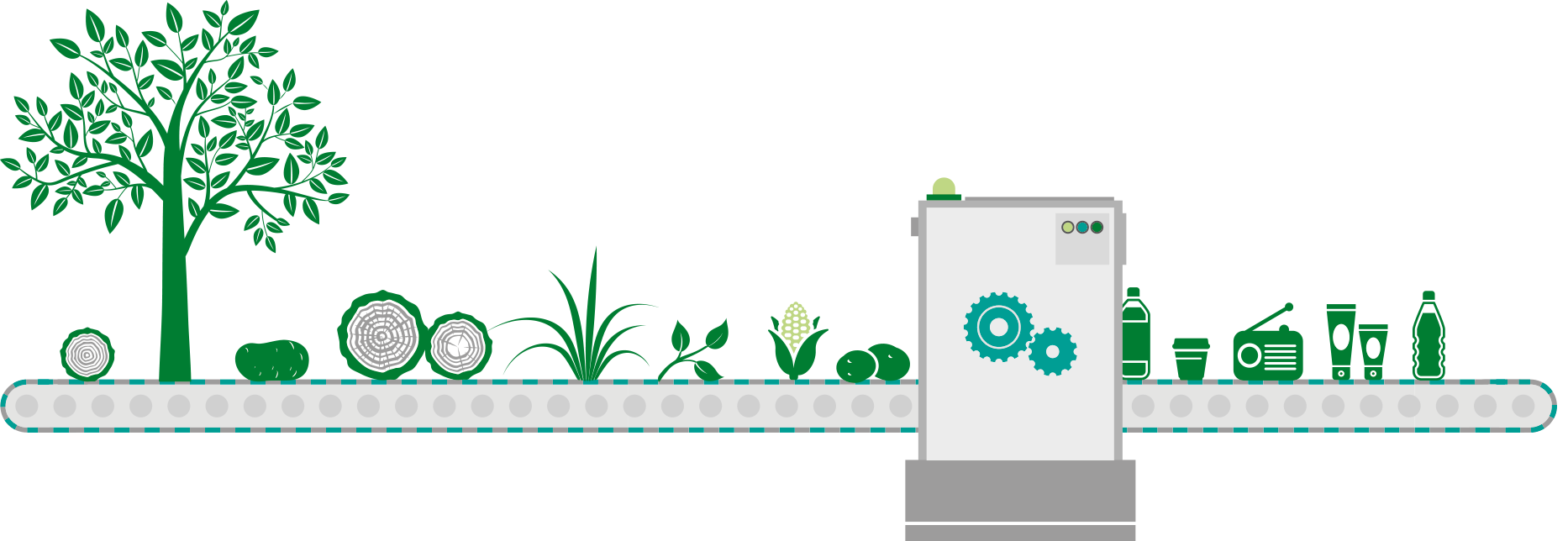Modern bioplastics are now suitable for an impressive range of applications without the need for new equipment or infrastructure. Our biopolymers are suitable for both short-life and disposable products, as well as long-life applications.

Problem
The development of sophisticated packaging has vastly improved the shelf life of products whilst helping to define brands’ relationships with their customers. However, with vast amounts of packaging ending up in landfill, unsustainable packaging is a highly visible environmental issue.
Solution
Bioplastics provide an ideal solution, removing the environmental impact without removing the packaging. Our plant-based polymers compost at the end of their useful life. Our products can be used for a wide range of packaging items, from primary and secondary packaging films, laminates and rigid sheets for thermoforming and vacuum forming, to point-of-sale displays, trays and merchandisers.
Products
Our flexible films offer enhanced print and adhesion characteristics, enabling excellent print quality as well as lamination at high speeds.
Our high temperature range shows unrivalled heat resistance, allowing products to be protected to over 90ºC (194ºF).

Problem
The electronics industry has made considerable strides in addressing its environmental impact, primarily through improving the energy efficiency of products and devices. It is equally important, however, that the industry addresses the sustainability of the materials it uses.
Solution
Bioplastics can be injection moulded with characteristics similar to ABS, without any modifications required to existing machinery. Bioplastics can be used in place of oil-derived equivalents for plastic casings and parts. They are plant derived and typically process at a lower temperature than conventional plastics, contributing to the overall sustainability of electronic products.
Products
Bioplastics have traditionally shown poor temperature resistance, but our high temperature range has a softening point of up to 110ºC (230ºF), some 40-50ºC higher than other commercially available bioplastics, making it an ideal choice for electronic applications.

Problem
With transport representing one of the highest contributors to global carbon emissions, automotive manufacturers are addressing materials as part of the drive to design more sustainable vehicles. In this industry, safety and performance are paramount and cannot be compromised.
Solution
Bioplastics can be used in place of oil-derived equivalents for the automotive industry. They can be injection moulded with characteristics similar to ABS, without any modifications required to existing machinery.
Products
Bioplastics have traditionally shown poor temperature resistance, but our high temperature range has a softening point of up to 110ºC, some 40-50ºC higher than other commercially available bioplastics, making it an ideal choice for the automotive industry.

Problem
UK pubs, restaurants, takeaway outlets and hotels produce over three million tonnes of waste every year. The challenge is to create sustainable packaging without impacting on food quality or safety, or inconveniencing the customer. The desire for resources that are GM-free and non-food-derived is particularly important to this sector.
Solution
Our biopolymers are suitable for a wide range of catering and food-to-go products, from thermoformed coffee cup lids to injection-moulded cutlery. Our plant-based products perform as well as oil-derived equivalents, and are 100% biodegradable and ready to compost along with food waste.
Products
Our high temperature range is ideal for the food service sector offering temperature stability from 70ºC (158ºF) up to 110ºC (230ºF). Furthermore this range is GM-free and based on a non-food source.
Our range of flexible films are perfect for packaging, offering enhanced print and adhesion characteristics, enabling excellent print quality as well as lamination at high speeds. These can be used either as a mono film or in multi-layer constructions.

Problem
The cosmetics industry creates over 120 billion units of packaging a year. Much of this is short lived and often ends up in landfill. Even the most basic daily personal care products, such as toothbrushes and razors, pose a major environmental challenge. However, consumers have come to expect high standards and don’t want to compromise on quality in the drive for a more sustainable solution.
Solution
Our plant-based bioplastics ensure that brands in the cosmetics and personal care sector are caring for both people and the environment. Our materials can be extrusion blow moulded to form opaque, soft-feel bottles whilst accompanying bioplastic caps can be injection moulded.
Product
Please talk to us about your specific performance requirements for cosmetics and our team of technical specialists will provide guidance on creating a custom blend.

Problem
As a highly carbon intensive sector, industry is increasingly focused on how best to process limited natural resources into products with minimal environmental impact and reduced greenhouse gas emissions.
Solution
Bioplastics meet the demand for both long-life and cost-effective materials that underpin the sustainability of operations. Our product ranges are optimised for films, fibres, casting, moulded and roto-moulded items.
Product
Our range of materials offer start of life as well as end of life benefits for industry. View our full product range to find a product that suits your requirements, or talk to our technical team about your specific requirements.


